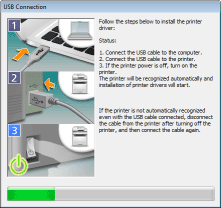Solution
<Cause 1>
Is the printer turned ON?
<Solution>
Turn the printer ON.
<Cause 2>
Are the printer and the computer connected correctly via a USB cable?
<Solution 1>
Connect the printer to a computer with a USB cable. Connect the flat connector of the USB cable (a) to the computer, and connect the square connector (b) to the printer.
<Solution 2>
Change the USB cable. If you are using a long USB cable, replace it with a short one.
<Solution 3>
If you are using a USB hub, connect the printer directly to your computer using a USB cable.
NOTE
- If your printer does not come with a USB cable, you will need to provide your own cable separately.
- Make sure that the USB cable you use has the following mark.
- If a Plug and Play automatic setup screen like the one shown below is displayed when you connect the USB cable, click [Close] or [Cancel] to close it.
<Cause 3>
Was the printer turned ON before you installed the printer driver? If so, turn OFF the printer and unplug the USB cable, and then reinstall the printer driver.
<Solution>
Perform the following procedure.
1. Turn OFF the printer.
The printer may not be recognized if you install the printer driver with the printer turned ON. Always turn OFF the power before installing.
2. When the following screen appears, connect the computer and the printer with a USB cable, and turn ON the printer.

Installation of the printer driver starts.
<Cause 4>
The USB class driver is installed.
<Solution>
Uninstall the USB class driver using the following procedure.
1. Confirm whether the computer and printer are correctly connected by a USB cable, and whether the printer is switched on.
2. On the [

] (Start) menu, click [Control Panel] - [Hardware and Sound] - [Device Manager].
If the [User Account Control] dialog box is displayed, perform the following operation.
- If you have logged on using an administrator account, click [Continue].
- If you have logged on as a user, enter the administrator account password and click [OK].

For Windows 8.1/Server 2012 R2:
From the desktop, display the charm bar to the right of the screen, and click or tap [

Settings] - [Control Panel] - [Hardware and Sound] (or [Hardware]) - [Device Manager].

For Windows 8:
From the desktop, display the charm bar to the right of the screen, and click or tap [

Settings] - [Control Panel] - [System and Security] - [Device Manager].

For Windows Vista:
Click [

] (Start) - [Control Panel] - [System and Maintenance] - [Device Manager].

For Windows Server 2003/Server 2003 R2/Server 2008/Server 2008 R2:
2-A-1. From the [Start] menu, select [Control Panel] (- [Performance and Maintenance]), and double-click the [System] icon.
2-A-2. In the [System Properties] dialog box, click the [Hardware] tab → click [Device Manager].
3. Delete the USB class drivers displayed under [Universal Serial Bus controllers].

Select the name of the printer you are using, then click [Uninstall].
Make sure you do not delete items other than USB class drivers. If you delete something else by mistake, Windows may no longer operate correctly.
If USB class drivers are displayed under [Other Devices], they have not been installed correctly. Select the USB class drivers and delete them according to the operating system you are using.
4. If the [Confirm Device Uninstall] (in Windows Server 2003/Server 2003 R2, [Confirm Device Removal]) dialog box is displayed, click [OK].
5. Close [Device Manager].
6. Close [Control Panel].
7. Remove the USB cable from the computer and restart Windows.
8. Uninstall the driver, and then install the USB class driver. For details on the procedures for uninstalling the driver and then installing the USB class driver, see "Printer Driver Installation Guide."
IMPORTANT
If you cannot correctly finish installing the driver, be sure to uninstall the driver before attempting to re-install it.






 Installation of the printer driver starts.
Installation of the printer driver starts. ] (Start) menu, click [Control Panel] - [Hardware and Sound] - [Device Manager].
] (Start) menu, click [Control Panel] - [Hardware and Sound] - [Device Manager]. For Windows 8.1/Server 2012 R2:
For Windows 8.1/Server 2012 R2: Settings] - [Control Panel] - [Hardware and Sound] (or [Hardware]) - [Device Manager].
Settings] - [Control Panel] - [Hardware and Sound] (or [Hardware]) - [Device Manager]. For Windows 8:
For Windows 8: Settings] - [Control Panel] - [System and Security] - [Device Manager].
Settings] - [Control Panel] - [System and Security] - [Device Manager]. For Windows Vista:
For Windows Vista: ] (Start) - [Control Panel] - [System and Maintenance] - [Device Manager].
] (Start) - [Control Panel] - [System and Maintenance] - [Device Manager]. For Windows Server 2003/Server 2003 R2/Server 2008/Server 2008 R2:
For Windows Server 2003/Server 2003 R2/Server 2008/Server 2008 R2: Select the name of the printer you are using, then click [Uninstall].
Select the name of the printer you are using, then click [Uninstall].